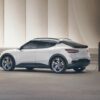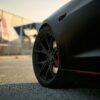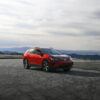After 16 years with Carlos Goshn as CEO, Hiroto Saikawa took over the role in April 1. He recently sat down with Automotive News to talk about the next generation Nissan Leaf, and his plans for Nissan’s new global partner – Mistubishi Motors Corp.
Nissan was essentially the first to market with a mass-produced electric vehicle back in 2010 with it’s Leaf. Since then, Nissan appears to have been coasting off of that success and now finds itself behind (think 200 mile Chevy Bolt). Back in January, Nissan’s own CPO Philippe Klein said “Five or six years ago, we were looked at as a kind of adventurous company […] and now you have a lot of players making big announcements, and we are looking like laggards.”
Starting with the next-generation Leaf, Saikawa will try and make that change. The 2018 Leaf will arrive by the end of 2017 with a longer range battery and a new design. Even though it’s technically a new design based on the Nissan IDS Concept, the camouflaged shots that are showing up appear that it could be similarly ‘unique’ looking like the first generation Leaf.
Future EV Plans
Saikawa said that within 2 years, Nissan will have a vehicle with battery upgrades that will beat range anxiety for long-traveling North American customers. He didn’t specify if that was just one vehicle or a few models, and if it included the Leaf or if it was all-new vehicles.
He went on to say that before 2020, Nissan will provide models that will be able to reach a range of 300 miles on a single charge – putting them in direct competition with gasoline powered vehicles. Saikawa said that a 300 mile of usable range is “Good enough”.
A 300 mile vehicle would put Nissan ahead of Chevy, unless they increase the Bolt EV battery capacity to take them beyond the current 238 mile range.
“The real evolution will come when we have a serious plan for substitutions of existing powertrains” in Nissan’s major models like the Rogue and X-Trail. “A major part of it will be EV […] Maybe 2025.”
Mistubishi Plans
Saikawa made it clear that Nissan wants Mitsubishi to succeed in the U.S. and wants to boost its presence there. “My first wish is that they should start growing, rapidly, and they should regain ground in the U.S. as soon as possible.,” Mitsubishi sold around 1 million vehicle last year worldwide. He went on to say that Renault might consider supplying cars to Mitsubishi because Renault doesn’t currently sell in North America.





As a current owner of a 2012 Leaf SL with 9 capacity bars remaining, I hope Nissan will allow future EV battery packs of higher capacity i.e 30Kwh or even 40Kwh to be installed in first generation models. Obviously, there’s more to it than just swapping
degraded batteries out. Most other Leaf owners I have spoken with love their cars and I include myself among them. What better way to say to Leaf owners in particular and the EV community at large how dedicated NISSAN is the this expanding market segment.
My hope is that future battery Research and Development technology can and will be designed to allow for retrofit and replacement to older models providing the latest vehicle platform is not substantial altered. Understanding cost is almost always foremost not just in R&D, sales, marketing etc. but also the end consumer, many of whom bought their Leafs used (myself included) in large part because of the initial cost. What better way for NISSAN to show they stand behind there products and there customers than to offer an upgraded battery option, something I believe no other EV manufacturer offers. Any responses or comments are welcome.